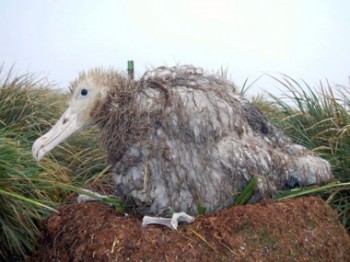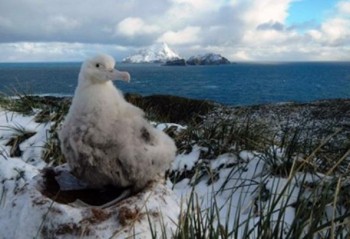The following account by field researcher Stephanie Winnard of a Vulnerable Wandering Albatross Diomedea exulans chick being rescued from a hole in the ground on Bird Island, South Georgia (Islas Georgias del Sur)* in the South Atlantic makes a good-news story for year end. The source is the South Georgia Newsletter for November 2013. She also reports on Bird Island’s declining population of Wanderers.
“As part of the long term monitoring programme on Bird Island, the wandering albatross chicks are visited once a month to monitor breeding success. The monthly check in July proved more eventful than normal as one chick seemed to be missing. The bird had left its nest and fallen down a hole that was around a meter deep; it had become completely wedged in and soil had fallen on top of it so that all was visible was its head. After digging it free, an exhausted, mud-covered chick was eventually pulled out and returned to its nest."

Looking worse for wear, the Wanderer chick was dug out of the hole and returned to the nest
"At first one leg seemed injured but a few visits later the chick was sitting up again as normal, with little obvious permanent damage. Without the rescue the chick would surely have died because its parents would not have been likely to find it to feed it. Hopefully it will fledge in November or December with the rest of the 2013 cohort. Every chick is vitally important as the wandering albatross is now classified as vulnerable."

The lucky chick fully recovered
"The Bird Island population has been monitored since 1958, and has shown a continual decrease in numbers. In 1972 there were 1582 pairs of breeding adults on the island, this year there were only 748 pairs, a reduction of 47% in 41 years.
Hopefully chick 4007001 will not fall victim to a fishing hook and will return in a few years to breed.”
John Cooper, ACAP Information Officer, 30 December 2013
*A dispute exists between the Governments of Argentina and the United Kingdom of Great Britain and Northern Ireland concerning sovereignty over the Falkland Islands (Islas Malvinas), South Georgia and the South Sandwich Islands (Islas Georgias del Sur y Islas Sandwich del Sur) and the surrounding maritime areas.

 English
English  Français
Français  Español
Español